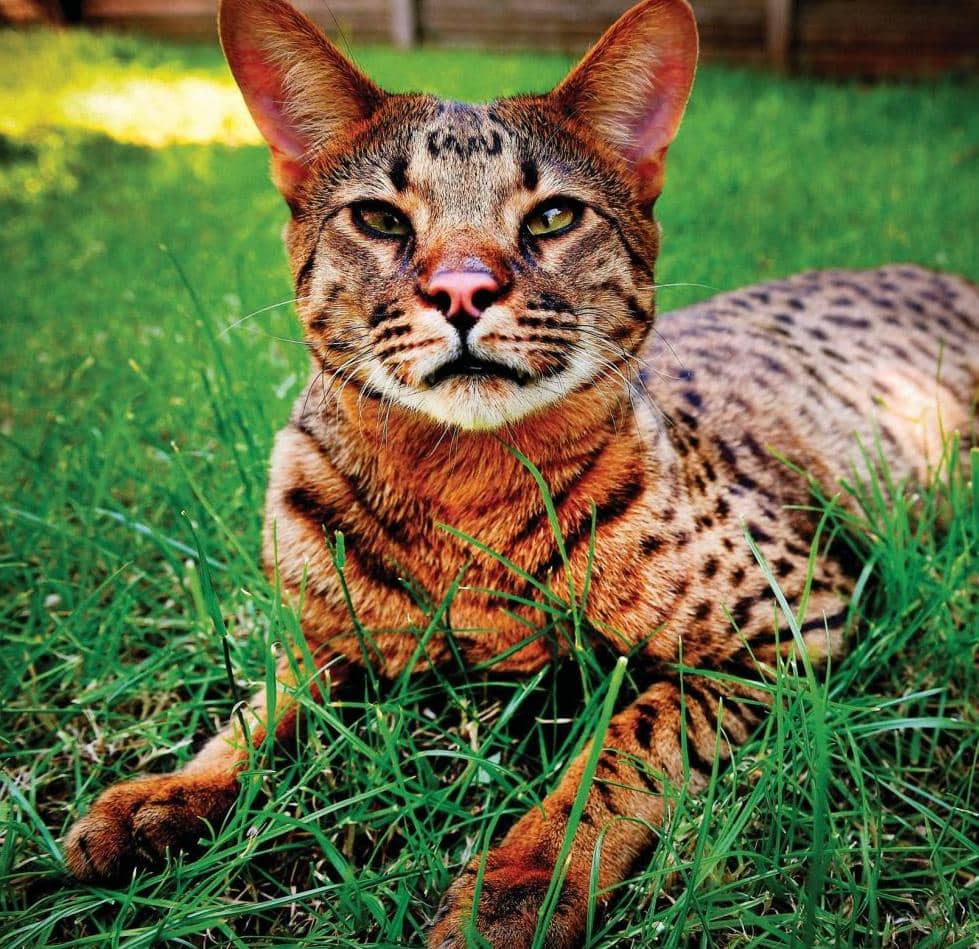
IMAGINE FOR A MOMENT THAT THE UK was breeding wild wolves with poodles and selling their hybrid puppies on the internet. Sound a bit 'off' for a nation of animal-lovers aspiring to be world leaders in animal welfare? Yet here we are in the 21st century with a growing legal trade in breeding exotic wild cats with domestics to create 'trophy' pets.
Savannah cats are a cross between a serval (a wild felid found in Africa) and a domestic cat. They sell for vast sums of money, but owning such an animal comes with a host of challenges that can result in harm to children, native wildlife, and to the cats themselves.
The story of the savannah cat started back in 1986, in Pennsylvania, USA, when a male serval bred with a domestic Siamese. Bengals and chausies, the equivalent hybrids of leopard and jungle cats respectively, were already on the scene by this time (see box on p61). However, it wasn't until 2001 that The International Cat Association formally adopted the savannah breed, enabling it to be exhibited at shows and to compete against domestic breeds. This sparked a surge in the keeping and breeding of these animals, which now fetch upto £20,000 for a first generation (F1) kitten. The 'F' (filial) number indicates how many generations an individual is from its original serval parent.
FOR ANYONE NOT FAMILIAR WITH F servals, they are undeniably exquisite felines. Lean and long in the leg, they sport a composite, honey-coloured coat of black spots morphing into stripes that lead up to their crowning glory - a pair of fennec-fox-like ears.
This story is from the June 2022 edition of BBC Wildlife.
Start your 7-day Magzter GOLD free trial to access thousands of curated premium stories, and 9,000+ magazines and newspapers.
Already a subscriber ? Sign In
This story is from the June 2022 edition of BBC Wildlife.
Start your 7-day Magzter GOLD free trial to access thousands of curated premium stories, and 9,000+ magazines and newspapers.
Already a subscriber? Sign In

Jump Around - Bagheera Kiplingi - The acrobatic spider with a predilection for veggie food
Spiders eat flies, right? everyone knows that the 45,000 or so spiders in the world are all obligate carnivores, more or less – eating other animals, mainly invertebrates. Nature, however, loves an exception, and one particular spider missed out on that ecological memo. It goes by the wonderful scientific name of Bagheera kiplingi, and its claim to fame is that its diet is – at least mostly – vegetarian.

Female of the Species - Zebras - A strong sisterhood is key to staying safe
Zebras are masters of confusion. Their collective noun is ‘a dazzle’, which is fitting since their bodies and behaviour have been surprising scientists for centuries.

See It, Save It? - Wildlife tourism can be a powerful ally in protecting nature - but it can also harm it. We weigh up the pros and cons.
The sums of wildlife travel aren’t as simple as more tourists equals happier nature. How much did my visit really contribute to the conservation of Lady Liuwa and her habitat – and was that outweighed by carbon emissions from my flights? Did my presence disturb the animals’ natural behaviour more than it reduced the threat of poaching or benefited local communities?The question of whether wildlife travel is, on balance, good for wildlife is a complex one – and there’s no simple answer.

Can Your Really Offset Emissions? - Planning an overseas wildlife-watching trip entails facing some inconvenient truths
Imagine (or maybe you don't need to) that you hanker after the safari trip of a lifetime in sub-Saharan Africa. A 17-day tour beginning at the iconic Victoria Falls, passing through Zimbabwe, Zambia, Malawi and Tanzania, taking in some of the continent’s most wildlife-rich national parks, and ending on the lush island of Zanzibar.

Metamorphosis: a life-changing event
WITH EVOLUTIONARY BIOLOGIST JV CHAMARY

New series for BBC One: Asia
Settle in this autumn for a new natural-history extravaganza on BBC One and iPlayer: the longawaited Asia, presented by Sir David Attenborough.

Loss of Antarctic sea ice could impact seabird food supply
Albatrosses and petrels may be forced to fly further to feed

Tarsiers in trouble
Urgent action is needed to ensure survival of the Yoda-like primate

SNAP-CHAT
Chien Lee on shrew loos, rogue drones and being rained out of bed

VISIONS OF NATURE
The winners of the Wildlife Artist of the Year competition 2024, from David Shepherd Wildlife Foundation